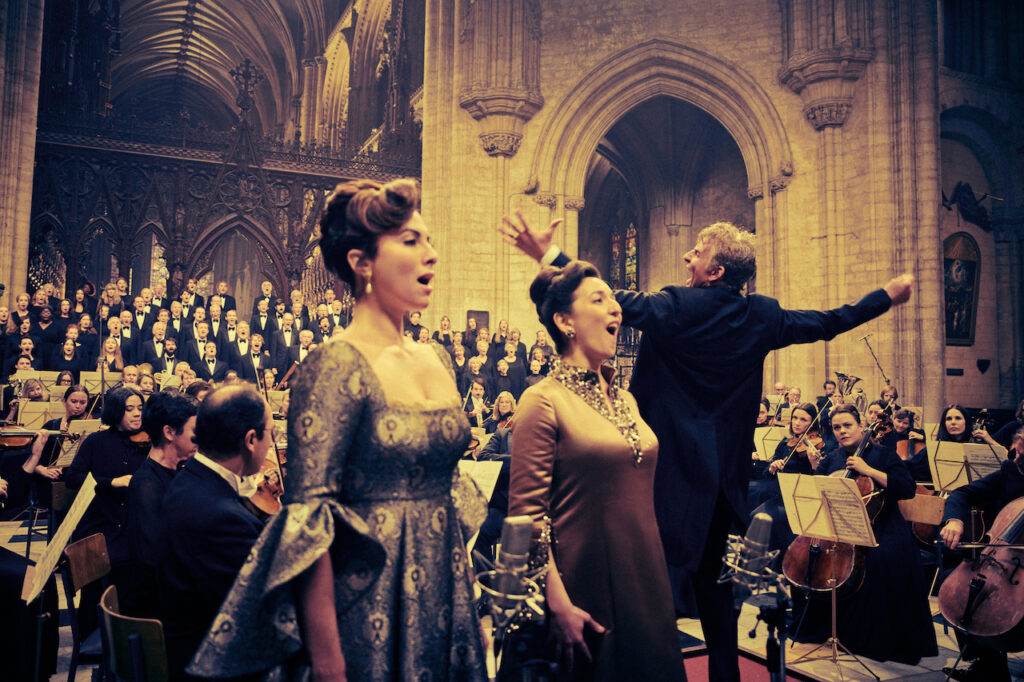
(***1/2)
Should Bradley Cooper change his name to Bradley Scorsese? That thought must have crossed the minds of the NYFF filmgoers who attended the premiere of Maestro, Cooper’s homage to Leonard Bernstein. From the moment the film started at the new David Geffen Theater in New York’s Lincoln Center, Cooper’s transformation from actor/director to actor/auteur was on view. Certainly, the location’s history, former home of the Philharmonic Hall, which Bernstein christened in 1962, added to the auspicious occasion that showcased a budding filmmaker’s metamorphosis.
The bio/mus/dra looks as if it has been thoroughly researched, nurtured, given time to gestate then had Cooper’s burgeoning sense of aesthetics applied. From the beginning, this story is meted out in epochs with the footage mimicking the times. B&W for the ‘40s. Muted technicolor tones for the ‘50s. Lifelike colors and lighting for the rest of Bernstein’s life. The dialogue reflects the eras, too. When Bernstein’s music (West Side Story) plays its wondrous. When he conducts classical pieces (“Adagietto” from Mahler’s Symphony No. 5) the soundtrack becomes mesmerizing.
Leonard (Cooper) is at a tony New York house party in 1946 when he meets the well-known Costa Rican-Chilean actress Felicia Montealegre (Carey Mulligan, Shame). Singers gather around the piano doing show tunes. Leonard and Felicia’s eyes meet. Their quick-witted humor interlocks. He courts, sparks and marries her. Over the years they raise children who become young adults (Maya Hawke, Alexa Swinton, Sam Nivola) never quite sure of their parents’ marriage and if their dad was giving them his full attention. He wasn’t.
The brash composer/conductor launches his career as a last-minute substitute for another maestro, He enthralls that audience and those that follow. All the while, Leonard surrounds himself with other artists, some gay, some boyfriends (Matt Bomer, Magic Mike). In the beginning it’s all hush hush. Over the years, secrets turned into gossip, gossip into public indiscretions, indiscretions into willful flaunting. At first Felicia is blind, then suspicious, aware but not accepting and finally resigned.
The early years seem light, blasé and shallow. Parties, concerts, affairs. Hard to connect emotionally with the main character. He’s brilliant but off putting. Nothing seems to stick, except that this very gifted pianist, conductor and composer is well-aware of his talent and stuck on himself. His pleasure. His career. Any hurt he causes, he smooths over. Not for the other person’s sake, more to assuage his own guilt. Hard to like him. Easy to admire his talent.
Felicia’s anger evolves from uncomfortable feelings to absolute rage. In one of the most dramatic scenes, as written by screenwriter Josh Singer and cowriter Cooper, she fumes at her husband. They’re in their perfectly arranged Central Park area apartment (production designer Kevin Thompson; set decorators Liz Ainley and Rena DeAngelo; art director Andrew Ackland-Snow). As the argument comes to a boil, the Macy’s Thanksgiving Day Parade marches by. A large floating Snoopy looks through the window as Felicia screams her biggest accusation: “You’re a fraud!” It’s in reference to her husband not being true to himself, regarding his music and conducting. It wounds him. On the surface she’s speaking artist to artist and giving him constructive criticism. Down deep she’s incensed at the way he treats her.
Audiences may think that the drama couldn’t get more intense after that sequence. But minutes later in a cathedral, Bernstein directs a choir and orchestra as he conducts his interpretation of Mahler’s Second Symphony. The camera (cinematographer Matthew Libatique, Black Swan) flows over the performing artists, circling around the conductor’s head, zeroing in on Cooper. The actor is lost in the music, mouth gaping open, eyes bugging out his head. It’s a euphoric moment for the character and especially the actor.
Arms, hands and a baton wave in the air furiously, sometimes punctuating crescendos. Bernstein eggs the singers and instrumentalists on to great heights. This is the film’s zenith. Cooper wrings every ounce of emotion and drama out of the scene with just movement and facial expressions. This is when the actor/director’s entire vision crests.
Initially, in the 1940s years, Cooper’s performance seems more like an affected caricature of Berstein. That superficial grandness subsides. The actor grows into the conductor’s persona quite well as the character’s arc is revealed. He gives Leonard the heart he needs to make audiences like him. Mulligan, an Oscar-caliber artist (Suffragette, Mudbound, An Education), may soon be an Oscar-winning actress. Her Felicia is lively, circumspect and forgiving. Then graced with a certain dignity that pulls the entire movie together.
Curiously, the controversial relationship the Bernsteins had with the Black Panthers, at a time when few white artists supported their initiatives, is not mentioned. In 1970, Felicia, an anti-war, civil rights activist, had a fundraiser at their apartment for “Panther 21.” It was a way to aid 21 Panther members who were held in jail with an extremely high bail. The photo of the Bernsteins and BP Field Marshall Donald Cox became iconic, as did the vitriol that followed. Some called the mingling of white wealthy people with Black activists “radical chic.”
All that Bradley Cooper wanted to capture is on the screen. The actor who clowned through the Hangover franchise and aptly directed A Star is Born has created a work of art. A thoughtful, artistic expression. The kind Martin Scorsese masterminds.
That night, at Lincoln Center’s David Geffen Theater, Maestro’s New York Film Festival premiere was a triumph. Bravo.
Trailer: https://www.youtube.com/watch?v=zU6GbM5c9aE
For more information about the New York Film Festival go to https://www.filmlinc.org/nyff2023/.
Visit Film Critic Dwight Brown at DwightBrownInk.com.